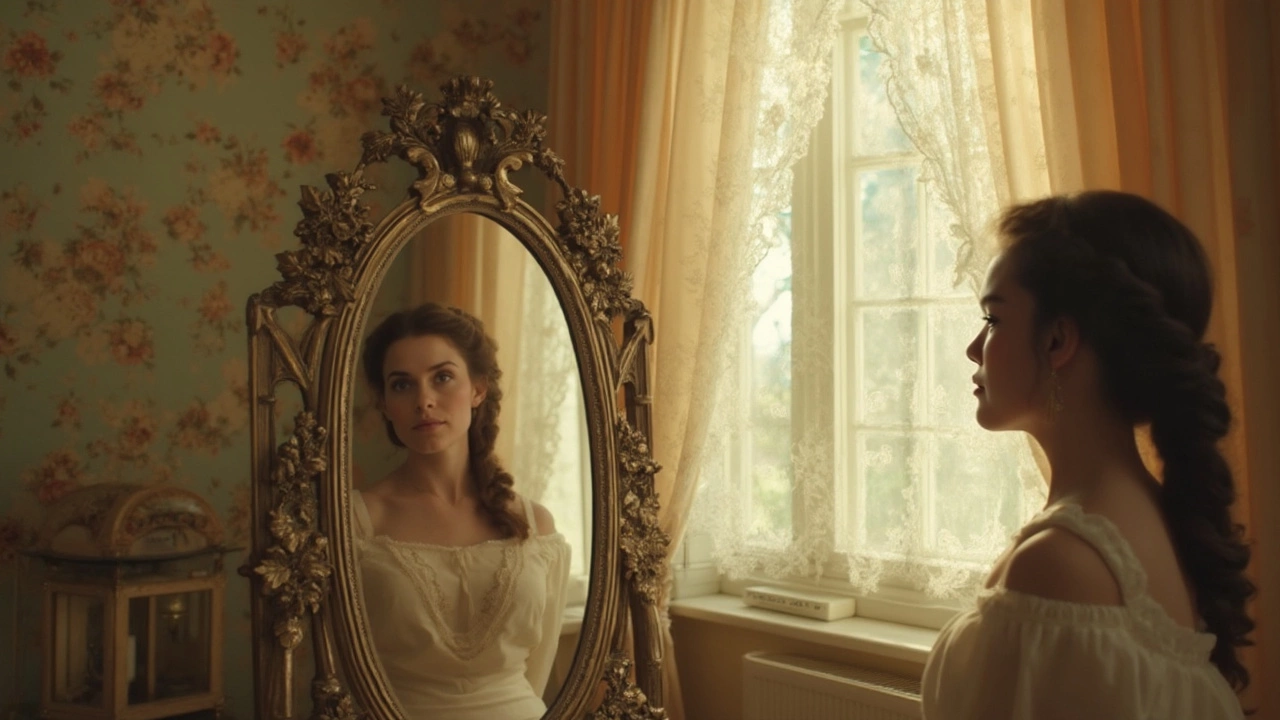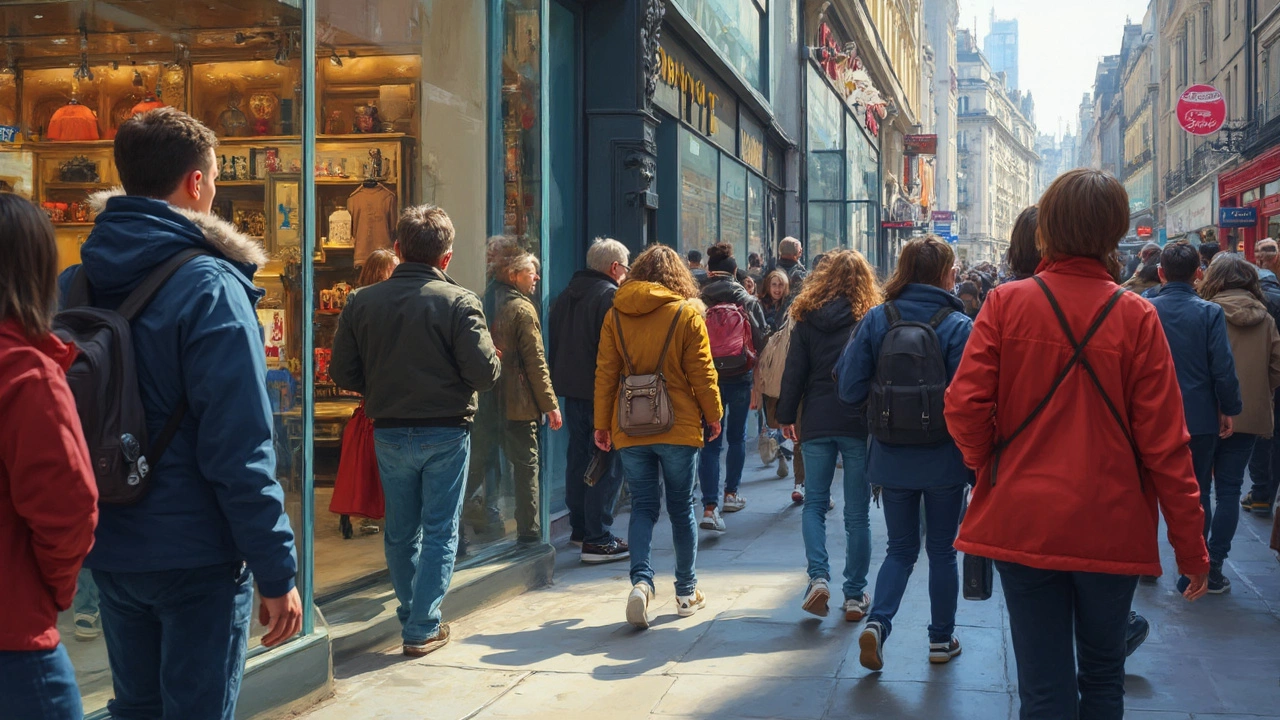Is It OK to Not Look in the Mirror?

Have you ever considered what life would be like without constantly checking your reflection? In a world where appearances seem to matter more than ever, avoiding the mirror might sound strange. But guess what? There are some hefty reasons people are doing just that. Mirrors have a sneaky way of influencing how we feel about ourselves—sometimes not for the better.
Taking a break from staring at ourselves can actually boost confidence. Sounds weird, right? But studies suggest that too much mirror time can lead to harsh self-criticism. So, what happens if you just skip it? You might find more peace in your own skin. That's not a bad trade-off.
- The Mirror's Role in Daily Life
- Psychological Impact of Mirrors
- Benefits of Mirror Avoidance
- Potential Downsides of Skipping the Mirror
- Balancing Self-Awareness and Self-Acceptance
- Tips for Mindful Reflection
The Mirror's Role in Daily Life
Think about it: mirrors are so much a part of our routine, they’re almost invisible. They're in bathrooms, bedrooms, changing rooms, and shop windows. But they've got more sway over us than we might like to admit.
Mirrors are not just about checking out how our hair is doing—though, let's be honest, that's a big part of it. They're about how we present ourselves to the world, shaping our self-image and even affecting our mental health. They're kind of a staple in building confidence for a day's work, a night out, or just a moment of self-assessment.
Here’s an interesting tidbit: humans have been using mirrors for thousands of years, starting with polished stones and metals before moving to the glass versions we know today. They've always been about more than just seeing ourselves—they're about self-reflection (pun intended).
But it’s not all rainbows and sunshine. There’s a catch: sometimes, mirrors can be a bit of a double-edged sword. Spend too much time in front of one, and it can kind of mess with your head. You might start noticing flaws that weren’t even there, leading to unnecessary anxiety.
- For some, it can even lead to what experts call 'body dysmorphia,' a condition where folks become obsessed with perceived defects in their appearance.
- Others argue that mirrors can perpetuate an unhealthy focus on appearance, rather than personality, accomplishments, or happiness.
So, while mirrors play a big role in our daily lives, balancing their use with a healthy perspective is key. How much do we let that reflection define us? Maybe it’s worth pondering the next time you catch yourself making funny faces in the bathroom mirror!
| Mirror Type | Time Period |
|---|---|
| Polished Stone | 6000 - 3000 BCE |
| Metal Mirrors | 2000 BCE |
| Glass Mirrors | First Century CE |
Psychological Impact of Mirrors
Mirrors do more than just show us our daily appearance; they play around with our minds too. Ever notice how you feel different about yourself after a quick glance in the mirror? You're not alone. Mirrors can tweak our self-image and, in some cases, our mental health.
The magic, or maybe the curse, of mirrors lies in their ability to influence our self-image. Staring at our reflection, we tend to pick apart our flaws, thanks to a nifty psychological quirk called self-objectification. Imagine this: you're prepping for a big day, and the mirror-loving voice in your head is throwing all sorts of doubts your way—makes staying confident a bit tricky, right?
Interestingly, the impact of mirrors can vary. For some folks, glancing at their reflection boosts confidence. But for others, it spirals into self-doubt, affecting mental health. Studies have shown that constant mirror checking can be linked to anxiety and body image disturbances. Not surprisingly, cutting down on mirror time might be a game-changer for some.
Want to know what the pros think? Experts in psychology suggest being mindful of how often and why you look in mirrors. They say it's all about balance. Too little might leave you unaware of a hair disaster, but too much could lead to unnecessary stress. Finding that middle ground is key to keeping our heads in a good place.
So, what's the takeaway? Mirrors don't just reflect our exterior—they reflect a chunk of our psyche too. Understand their power, and you might just master a healthier way to relate to your reflection every day.
Benefits of Mirror Avoidance
Skipping the mirror can actually shake things up in a good way for your mental health. Isn’t it nuts how sometimes less can be more? By not staring at your reflection, you're less likely to get caught up in comparing yourself to unrealistic standards. It can be really freeing—think of it as a small step toward boosting your self-esteem.
Let's talk numbers. An interesting study found that people who avoided mirrors for a short period reported feeling happier and more satisfied with their bodies. Sure, it sounds simple, but when you're not scrutinizing every detail, you tend to focus more on what you feel rather than how you look.
When you're not constantly checking your look, it helps create headspace to appreciate what your body can do, rather than just how it shows up visually. You have more room to think about healthy habits, hobbies, or just enjoying life without that nagging need to glance at your reflection.
Here's another perk: avoiding that self-image obsession can save you time. Imagine those extra minutes spent on something more fun, like a hobby or just chilling. Less time in front of the mirror means more space for activities that truly make you happy.
It's all about striking a balance. You don’t have to ditch mirrors altogether, but easing off can help you focus on who you are, not just what you look like. Give it a shot, see how it feels—it might just surprise you.

Potential Downsides of Skipping the Mirror
You might be thinking, "What's the harm in avoiding mirrors altogether?" Well, going completely mirror-free isn't without its hiccups. One of the main issues is missing out on those subtle cues about our physical health. Mirrors can sometimes help us notice something that's off, like changes in skin or posture that need checking out.
There's also the social aspect to consider. Whether we like it or not, appearances play a role in how we interact with others. Skipping mirrors all the time might lead to some mismatched outfit situations or unintended funky hairdos when heading to work or a big event. Imagine showing up at a wedding in pajama bottoms because you didn’t take one last look.
There's also the confidence factor for folks who find reassurance in their appearance. Mirrors can help boost self-assurance by allowing a quick glimpse to confirm everything's in place.
- Health awareness: Noticing changes in skin or physical condition can be important.
- Social confidence: Being able to check your appearance before stepping out might save from awkward moments.
- Outfit coordination: Ensures you’re dressed properly for whatever the day throws at you.
Avoiding mirrors completely could mean missing out on these benefits. So, while mirror avoidance might work for some, it's important to consider these potential downsides and strike a balance that fits your lifestyle and priorities. A little reflection now and then might be helpful, just to make sure you're not missing out on something important.
Balancing Self-Awareness and Self-Acceptance
Striking the balance between self-awareness and self-acceptance is a dance we all do, whether we realize it or not. It's kind of like trying to be your own best friend while also being your own toughest critic. On the one hand, knowing yourself is key to growth and understanding what you need. On the other hand, too much focus on perceived flaws can really hog-tie your confidence.
Start with some self-reflecting exercises that don’t involve a mirror. Meditate, journal, or just take a long walk alone. Pay attention to how these activities make you feel. You might discover that how you see yourself inside and how the world sees you outside are two different beasts entirely. This is about figuring out what truly matters to you versus what's imposed by society.
A few practical tips? Try listing things you genuinely like about yourself every day. It could be as simple as “I have a great sense of humor.” You'd be amazed at how much more effective this is for building confidence than any glance in a mirror.
- Start your day by acknowledging three things you’re proud of, unrelated to appearance.
- Avoid mirrors during your morning routine once a week and focus on other senses, like smell and sound.
- Practice gratitude by listing things you've accomplished by the end of the day.
Psychologists suggest that accepting imperfections does wonders for improving self-esteem. A peek into the mind shows that being kind to ourselves actually makes us more productive and happier. While awareness keeps us grounded and connected to who we are, acceptance gives us permission to be humanly imperfect.
Ultimately, it’s about blending both sides to form a healthy sense of self. Balance doesn't mean ignoring how you look, but it does mean recognizing that your worth isn't defined by your reflection. How’s that for a self-esteem booster?
Tips for Mindful Reflection
Finding a balance between ignoring the mirror completely and obsessing over your reflection can be tricky. Here are some practical tips to help you look in the mirror with confidence and a positive outlook.
- Set a Mirror Routine: It’s not about ditching mirrors entirely. Create a routine where you check the mirror a couple of times a day. Maybe once in the morning to make sure you’re presentable for the day, and again in the evening for skincare.
- Positive Affirmations: Before you look in the mirror, remind yourself of something positive. Simple affirmations like "I am enough" can set a positive tone and shift your self-image.
- Focus on Functionality: Use the mirror for practical tasks like brushing your hair or checking your outfit. Try not to linger too long; the longer you look, the more you tend to find flaws.
- Keep Mirrors in Check: Limit the number of mirrors around you. Having mirrors in every room might make avoiding negative self-criticism tougher.
- Mindful Reflection: There are days when you might want to skip the mirror altogether, and that’s okay. Listen to what your mental health is telling you. If it feels like a good day to give yourself a break, just do it.
Implementing these easy tips can make a big difference in how you see yourself. The key is to use mirrors as a tool for everyday tasks, not as a source of stress. Being aware of your mental health and self-perception can turn a simple routine into a more positive experience.